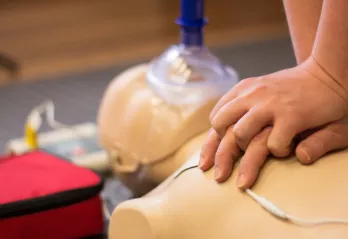Summer Safety: The Top Reasons Everyone Should Know CPR & First Aid

The sad truth about humans is that we are fragile. Thankfully, however, we realize how fragile we are and we have learned how to take care of others, and ourselves. We can take care of ourselves through methods like First Aid and CPR. While many people do not believe they have the time to learn, or simply don’t want to, they may not realize that every day we are at risk of being involved in a water safety incident or accident whether work related or while we are driving down the road. This is an important reason to learn First Aid or CPR. Read on to learn more.
The Know Before You Go program states the following reasons for why it is important to learn CPR/AED:
Drowning is the leading cause of accidental death for children ages 1-4.
One minute is all it takes for a child to drown.
88% of Cardiac Arrests happen in the home
Only 6.4% of Cardiac Arrest Victims survive because people witnessing the incident do not know CPR
Over 200,000 people die of Sudden Cardiac Arrest every year.
50,000 of the 200,000 deaths yearly could be prevented
According to the American Heart Association, 70% of Americans feel helpless to act during a cardiac emergency because either they do not know how to administer CPR, or their training has significantly lapsed. These statistics combined should tell you something. Since 88% of cardiac arrests happen in the home, it is very likely that the life you save with CPR is the life of a loved one.
So, why should you learn CPR?
Nearly 383,000 out-of-hospital sudden cardiac arrests occur annually, and 88 percent of cardiac arrests occur at home.
Sudden cardiac arrest is not the same as a heart attack.
Sudden cardiac arrest occurs when electrical impulses in the heart become rapid or chaotic, which causes the heart to suddenly stop beating.
A heart attack occurs when the blood supply to part of the heart muscle is blocked. A heart attack may cause cardiac arrest.
Statistically speaking, if called on to administer CPR in an emergency, the life you save is likely to be a loved one.
Effective bystander CPR provided immediately after sudden cardiac arrest can double or triple a victim’s chance of survival, but only 32 percent of cardiac arrest victims get CPR from a bystander.
Sadly, less than eight percent of people who suffer cardiac arrest outside the hospital survive.
CPR is an important skill to have. You can use it to save a life. Consider getting some training!
Why Learn First Aid?
First aid is an important skill.
By performing simple procedures and following certain guidelines, it may be possible to save lives by giving basic treatment until professional medical help arrives.
Remember, too, that practice makes perfect.
In an emergency there's no time to read instructions. If you've memorized some of the basic procedures, it will help you react quickly and efficiently.
Can make the difference from complete recovery and permanent disability
Can help you save a life
First Aid and CPR are extremely important. They can help you save lives, and the life you save may be someone you love. Remember that the YMCA offers CPR and First Aid training for a variety of locations. Learning CPR and First Aid may be one of the best things you ever do.
What Else Should I Know?
It is also extremely important to know what you can do to prevent drowning. Knowing preventative measures before you go swimming can save the lives of the people you care about most. If you have any children, you should make sure that they take a free swimming assessment. This will help you determine what you need to do to make sure your child doesn’t drown. There are many different resources available to you to help you prevent drowning. Follow these safety tips to ensure that you can prevent drowning!